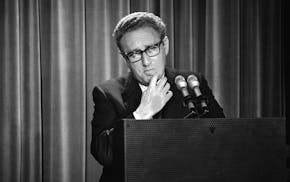Opinion editor's note: Strib Voices publishes a mix of guest commentaries online and in print each day. To contribute, click here.
•••
As we're called to remember the American experience in Vietnam, 50 years after the war's official end on April 30, 1975, ponder this: In the three countries most deeply affected by that war — Vietnam, Cambodia and Laos — more civilians have been killed by land mines and unexploded ordnance since "peace" in 1975 (or 1979 in the case of Cambodia) than the number of Americans who died there in all the years of brutal combat.
This is not to negate the horror that befell American families who saw their loved ones injured or killed. More than 58,000 Americans lost their lives in the war, and hundreds of thousands of others remain scarred by their service. That painful legacy is real. Yet, as Americans, we tend to place ourselves at the center of history and overlook the tragedies we inflict on those targeted by American power.
And in Vietnam, the tragedy was immense. Millions of people — both combatants and civilians — lost their lives, and countless others were maimed. American herbicides denuded most southern Vietnamese forests, with multiple generations still sickened by the toxic residue of these chemical agents. American bombs leveled villages and pockmarked the Vietnamese countryside, destroying people's rice paddies and with them their livelihoods and ancestral lands. And "170,000 old people" were made "lonesome," as a Vietnamese history museum once touchingly reminded visitors, because they lost their children and other family members to the American military campaign.
In light of such realities, it is hard to fathom what President Jimmy Carter could have possibly been thinking when, in 1977, he dismissed any U.S. moral obligation to help rebuild Vietnam despite a 1973 American agreement to do so, asserting, remarkably, that "the destruction was mutual."
That sense of victimization at the hands of the Vietnamese — that the war was somehow something they did to us — meant that it would continue for decades after it ended, though now by other means. As historian Ed Martini reminds us, the only thing worse than losing a war to the U.S. is winning one.
For 20 years after 1975, Washington sought retribution against the victors, refusing to recognize Hanoi diplomatically, maintaining a punishing embargo that stunted the country's recovery and doing everything it could to isolate Vietnam internationally. How far did this go? After the Vietnamese deposed the Khmer Rouge in early 1979, putting an end to one of the worst genocides of the 20th century, the Carter administration secretly supported efforts to resuscitate Pol Pot's forces so they could attempt to drive the Vietnamese-backed Cambodian government from Phnom Penh.
The Clinton administration's normalization of relations with Hanoi in 1995 did not put an end to Vietnamese suffering. Agent Orange "hot spots" remained unremediated, U.S. funding for unexploded munitions clearance barely trickled and, for at least several years into the 21st century, the U.S. waged a "catfish war" against the country, concocting numerous grounds on which to undermine one of Vietnam's largest agricultural exports. Bilateral trade "embodies the aspirations of the people of both countries to replace the conflicts of the past with the promises of a future of prosperity," Vietnamese official Nguyen Huu Chi said. But many in the U.S. weren't interested.
Vietnam's postwar embrace of capitalism and low-wage labor force did ultimately make it an attractive market for American manufacturers and multinational corporations. Bilateral cooperation thus improved in the 21st century, with the U.S. finally taking meaningful steps to begin addressing some of the physical legacies of the war.
And when the first Trump administration imposed tariffs on neighboring China in 2018, American businesses looked to Vietnam as a more reliable long-term bet. But Trump blew that all up when, earlier this month, he subjected the country to one of the steepest tariffs of any nation — 46% — in the administration's disastrous global trade war. The 46% tariff is now "paused," as are the higher variable tariffs for most countries, but the threat, which to Hanoi must seem like an echo, remains.
The Vietnam War was a complex event, in many ways as much a Vietnamese civil war as an American invasion. Like the majority who supported the revolution and resisted U.S. aggression, the anticommunists who collaborated with the U.S. also came to suffer, thrown into "reeducation camps" and compelled to flee as "boat people," desperate to find refuge in whatever country would take them. Many of these Vietnamese, just like many Hmong from Laos and Cambodian survivors of the genocide, would become Americans. And they began to thrive.
These Southeast Asian refugees and their descendants are now among the doctors, business owners, teachers, lawyers, bus drivers, scientists, chefs, mechanics, elected officials and novelists who have enriched Minnesota and the U.S. more broadly. At a time when tens of millions of Americans treat the word "immigrant" as an epithet, it is good to be reminded of this positive legacy of the war. Out of so much destruction, so much death, so much displacement and myth-making and denial, came our neighbors, our friends, my students.
Scott Laderman is a professor of history at the University of Minnesota, Duluth. His books include "Tours of Vietnam: War, Travel Guides, and Memory" (2009) and "Four Decades On: Vietnam, the United States, and the Legacies of the Second Indochina War" (2013).
Burcum: Running toward, not away from, the battle over vaccines
Readers Write: Violence prevention, Minneapolis politics, Trump's first 100 days
Opinion: The U.S. and Vietnam, five decades on

